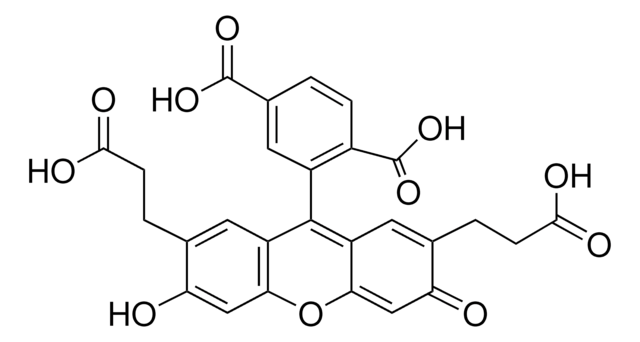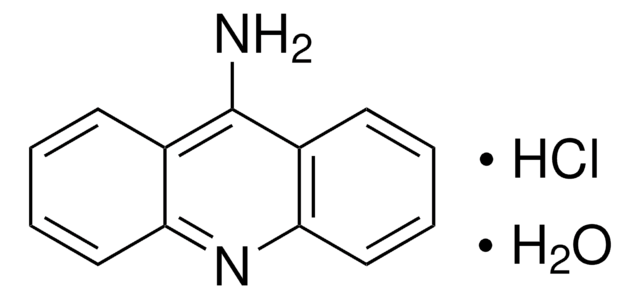14562
2′,7′-Bis(2-carboxyethyl)-5(6)-carboxyfluorescein tetrakis(acetoxymethyl) ester
BioReagent, for fluorescence
Synonym(s):
BCECF-AM
Sign Into View Organizational & Contract Pricing
All Photos(1)
About This Item
Empirical Formula (Hill Notation):
C39H36O19
Molecular Weight:
808.69
MDL number:
UNSPSC Code:
12352108
NACRES:
NA.32
Recommended Products
grade
for fluorescence
Quality Level
product line
BioReagent
form
solid
solubility
DMF: soluble
DMSO: soluble
acetonitrile: soluble
fluorescence
λex 482 nm; λem 528 nm in 0.1 M Tris pH 8.0 (esterase)
storage temp.
2-8°C
Looking for similar products? Visit Product Comparison Guide
Application
An uncharged, nonfluorescent molecule that is useful for noninvasive bulk loading of cell suspension because it is capable of permeating the cell membrane. Cellular nonspecific esterases cleave its lipophilic blocking groups, resulting in a charged, fluorescent form of the molecule. Compared to the parent compound, this charged derivative leaks out of the cell at a much slower rate. Utilized for pH measurements in perfused tissues, intercellular spaces, mammalian cells, plant cells, bacteria, and yeast. Also, employed to investigate in assays for cellular functional properties such as adhesion, multi-drug resistance, viability and cytotoxicity, apoptosis and chemotaxis.
Cell-permeable ester of BCECF that, on hydrolysis by cytosolic esterases, yields the intracellularly trapped pH-indicator BCECF. Allows simultaneous recording of cell volume changes and intracellular pH in single osteosarcoma cells.
Packaging
Bottomless glass bottle. Contents are inside inserted fused cone.
Storage Class Code
11 - Combustible Solids
WGK
WGK 3
Flash Point(F)
Not applicable
Flash Point(C)
Not applicable
Personal Protective Equipment
dust mask type N95 (US), Eyeshields, Gloves
Certificates of Analysis (COA)
Search for Certificates of Analysis (COA) by entering the products Lot/Batch Number. Lot and Batch Numbers can be found on a product’s label following the words ‘Lot’ or ‘Batch’.
Already Own This Product?
Find documentation for the products that you have recently purchased in the Document Library.
Customers Also Viewed
H W van Veen et al.
The Journal of biological chemistry, 269(47), 29509-29514 (1994-11-25)
The strictly aerobic, polyphosphate-accumulating Acinetobacter johnsonii strain 210A degrades its polyphosphate when oxidative phosphorylation is impaired. The endproducts of this degradation, divalent metal ions and inorganic phosphate, are excreted as a neutral metal-phosphate (MeHPO4) chelate via the electrogenic MeHPO4/H+ symport
R S Haworth et al.
Biochimica et biophysica acta, 1098(1), 79-89 (1991-12-13)
We have tested the efficacy of fluorescent probes for the measurement of intracellular pH in Saccharomyces cerevisiae. Of the compounds tested (fluorescein, carboxyseminaphthorhodafluor-1 (C.SNARF-1) and 2',7'bis(carboxyethyl)-5(6')-carboxyfluorescein), C.SNARF-1 was found to be the most useful indicator of internal pH. Fluorescence microscopy
M T Alonso et al.
The Biochemical journal, 272(2), 435-443 (1990-12-01)
The effects of arachidonic acid and thrombin on calcium movements have been studied in fura-2-loaded platelets by a procedure which allows simultaneous monitoring of the uptake of manganese, a calcium surrogate for Ca2+ channels, and the release of Ca2+ from
D Molenaar et al.
Biochimica et biophysica acta, 1115(1), 75-83 (1991-11-14)
The cytoplasmic pH of Lactococcus lactis was studied with the fluorescent pH indicator 2',7'-bis-(2-carboxyethyl)-5 (and-6)-carboxyfluorescein (BCECF). A novel method was applied for loading bacterial cells with BCECF, which consists of briefly treating a dense cell suspension with acid in the
P J Harris et al.
The American journal of physiology, 266(1 Pt 1), C73-C80 (1994-01-01)
The lateral intercellular spaces (LIS) of reabsorptive epithelia are the site of the proposed local osmotic gradient responsible for transepithelial transport. We developed techniques for loading the LIS of living cultured renal cells (MDCK and LLC-PK1) with the fluorescent dye
Our team of scientists has experience in all areas of research including Life Science, Material Science, Chemical Synthesis, Chromatography, Analytical and many others.
Contact Technical Service












